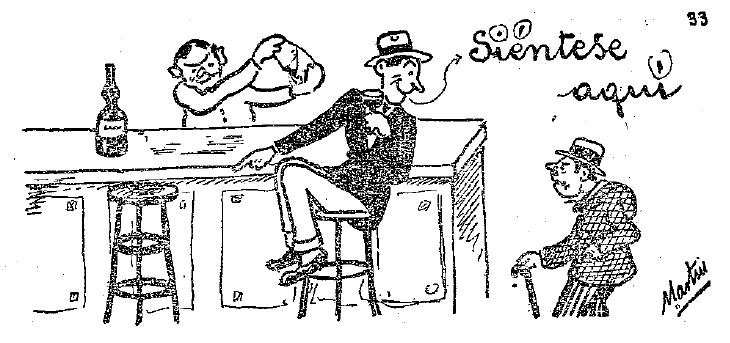
| Языки :: Испанский |
| Аудио |

 |
|
 |
|
95 |
Español |
Spanish |
|
Lección Treinta y tres (33) |
||
| ¿Dónde están los huéspedes ? (1) | Where are the boarders? | |
| 1 | En el comedor no había nadie, aunque ya eran las nueve. | In the dining-room, there was nobody, though it was already nine. |
| 2 |
En Madrid se come muy tarde. Me senté a la mesa y desplegué mi servilleta (2). |
In M. they eat very late. I sat down to table and unfolded my napkin. |
| 3 |
Esperé unos minutos, y luego, para matar el tiempo
(3), busqué (4) en mi diccionario de bolsillo los nombres de las cosas que no conocía : |
I waited for a few minutes, and then, to kill time, looked up in my pocket-dictionary the names of the things that I did not know : |
| 4 |
el plato, el vaso, el cuchillo, el tenedor, la cuchara. |
the plate, glass, knife, fork, spoon. |
| 5 |
Per fin llegó (5) la criada, con aceitunas, salchichón, pan, y una botella de vino. |
At last the maid arrived, with olives, polony, bread and a bottle of wine. |
| 6 |
Empecé (6) a comer con apetito de lobo; sopa, y luego pescado frito, tortilla, bistec con patatas y frutas. |
I began to eat, with a wolfish appetite; soup, and then fried fish, omelet, beefsteak with potatoes, and fruit. |
| 7 |
¿Le ha gustado la comida? ¿Quiere algo más? me preguntó (7) la dueña. |
Has the meal pleased you? Do you want something more? the landlady asked me. |
| 8 | Le contesté (8) que había comido bien, y era la verdad. | I answered her that I had well eaten and it was the truth. |
| 9 | Lo que me inquieta (9) es que, por lo visto, soy el único huésped; | What worries me is that apparently [by the seen] I am the only boarder; |
| 10 | prefiero comer en compañía, y hablando español (10). |
I prefer to eat in company, and speaking Spanish. |
| EJERCICIOS | EXERCISE : | |
| 1 | Siéntese aquí, le servirán en seguida. | Sit down here, we [(they)] will serve you presently. |
| 2 | ¿Cómo se llama ésto en español? | How is this called in Spanish? |
| 3 | Un tenedor. - ¿Y éso? - Un vaso (pron. basso). | A fork - And that? - A glass. |
| 4 | Muchas gracias; se me había olvidado. | Thank you very much; I had forgotten it [it had forgotten itself (from) me]. |
| 5 | ¿Quiere más pan? | Do you want more bread? |
| 6 | Haga el favor, y déme también otro plato. | (Yes) please, and give me another plate, too. |
| 7 | Dispénseme; ¿donde tengo yo la cabeza? | Excuse me, what am I thinking of [where have I my head]? |
| La cabeza (cabbeth-a) : the head. |
| NOTES. | |
| 1 |
Están and not son (implying
place). - Donde takes an accent when the first word in a question. - El huésped (wesspaid - very weak d), the boarder, guest. Una casa de huéspedes is the same thing as una pensión, but is said mostly of very cheap boarding-houses. |
| 2 |
Sentarse : to sit down; |
| 3 |
Esperar, to hope or to wait. |
| 4 |
Buscar : to seek; c changes to qu in busqué, sought, to preserve the k sound. |
| 5 |
Llegar, to arrive; llego, I arrive; llega,
he arrives; llegué, I arrived; llegó : he (or she) arrived. |
| 6 |
Empezar, to begin. |
| 7 |
Preguntar, to ask ; pregunto, I ask;
pregunté, I asked; preguntaré, I shall ask;
|
| 8 |
Contestar, to answer; contesto,
contesté, contestaré : |
| 9 |
Inquieta : worries (present). |
| 10 |
Hablo, hablé. hablaré : I speak, spoke, shall
speak; |
|
If we go on " grinding " these verbs, it's in order to make you familiar
with them by degrees; of course you can't absorb them at one draught; try light doses. |
